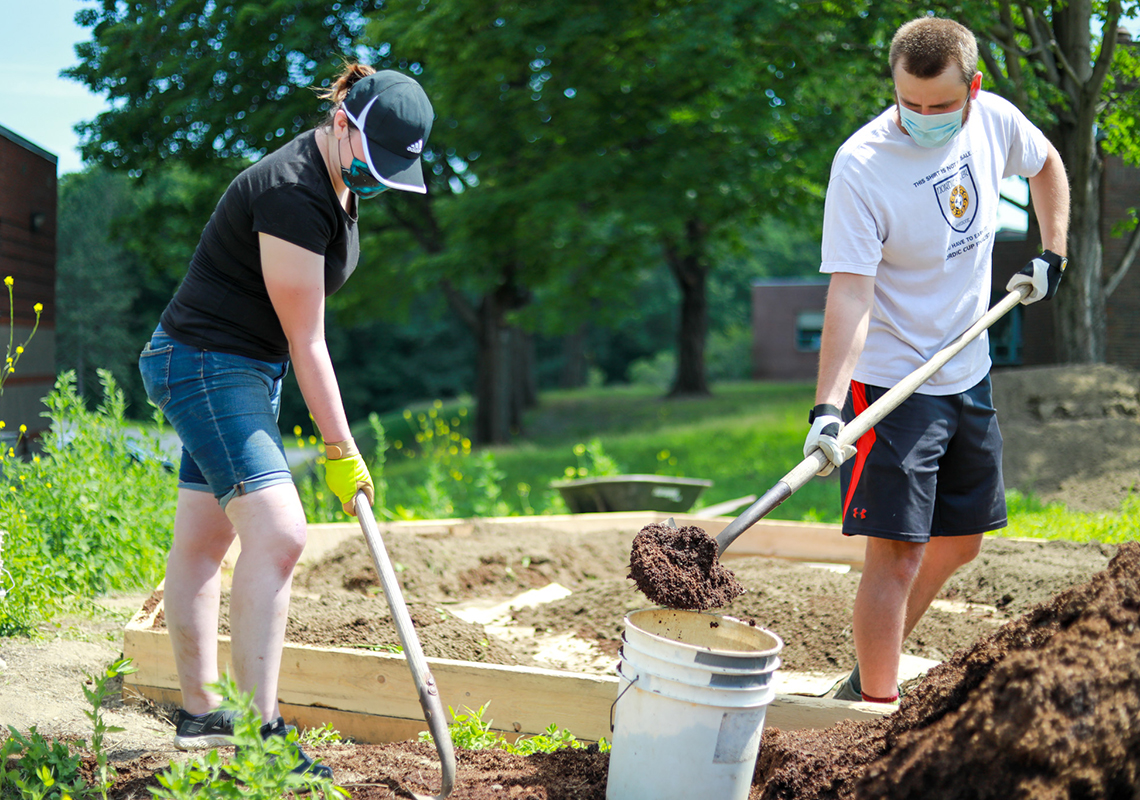
(Photo Credit: UMF Image)
FARMINGTON – Everyone is hungry to feel part of a community these days. In this time of Netflix-binging and virtual tours, endless emails and Zoom calls, the Covid-19 pandemic has introduced people to a new kind of community, one that must be maintained through screens and a strong internet signal. But at UMF, the new “Dig-it-all! Gardens & Community,” a summer web-based English course that involves the creation and the maintenance of a small-scale, sustainable organic garden, students are bridging the gap between the old definition of community and the new one.
The course was designed by faculty members Misty Beck and Gretchen Legler to fulfill their dream of having an on-campus garden while allowing students to learn remotely. From independent locations, students designed, planned, and advised in the tending of the approximately 2,700 square foot garden that can be seen on the UMF campus now. They come together for online class times to discuss the garden that they conceived of and designed as a group, carefully planning out the space that will eventually be used to supply donations to off-campus food banks.
“We were also fortunate in hiring two work-initiative students for the summer to help us grow the garden,” Legler said. “They’ve already been instrumental in helping to implement the class’s designs. James Cooke, an Environmental Policy and Planning major from Lyme, N.H., has been working on creating the online drawings and materials lists. Sara Taylor, an artist working in new media from Farmington, has created two short videos for the archives as well as begun work on social media visibility.”
The community does not simply end with the students and professors, though. To make this remote-learning experience possible, Beck and Legler have enlisted the UMF Facilities Management staff as well as other UMF faculty, and students to help build the raised beds and tend to the seedlings planned by the students currently enrolled in the class. Another part of the course involves students creating “a list of potential donors to match the materials needed” according to Beck. The students “put together a proposal featuring our shared values and design around accessibility, community and food security.” Included in the garden are “three sisters” (corn, beans, and squash) as well as other herbs. The Maine community has been generous with their donations and are always donating more plants and seeds, rising to Legler’s challenge: “You bring it and we’ll grow it.”
Furthermore, the importance of community gardens has been recognized by The Ella Lyman Cabot Trust in Boston, who gave the project a $6,300 grant to continue building the garden. The UMF faculty member Bud Martin and Agriculture Professional Dave Fuller from the UMaine Cooperative Extension have written a grant to bring Maine Hunger Dialogue to the UMF campus in the fall.
“I feel very strongly that students at UMF can benefit from having hands-on experiences with growing food, not only for the educational benefit, but for the emotional, physical and spiritual benefit,” Legler said. “Gardens are perfect spaces to reflect upon our relationship with the larger animate world, as well as places to learn about equality, justice, community, how to pay attention to small things, and, of course, a place to learn all manner of things related to the natural sciences.”
The need for community is not just on the UMF campus though. The Growing Maine Gardeners have even posted Community Garden Guidelines in the Time of Social Distancing to keep up with the demand for a place to gather to appreciate this sense of community. The UMaine Extension has also started posting weekly videos educating Mainers who have started growing their own gardens in this summer of isolation. The definition of community is rapidly extending its roots.




